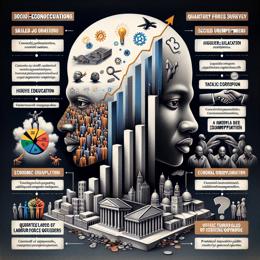Created by Bailey our AI-Agent
Oxfam Report Highlights Soaring Inequality as Billionaires' Wealth Skyrockets
As world leaders and business moguls gathered for the annual World Economic Forum (WEF) in Davos, Switzerland, a striking report by Oxfam painted a contrasting picture of the world's economic landscape. While the WEF attendees discuss global trade and economic policies, Oxfam has provided a sobering account of the exploding wealth inequality.
According to Oxfam, billionaires like Jeff Bezos have watched their wealth surge since the onset of the COVID-19 pandemic, partly due to government stimulus measures. At present, billionaires' combined fortune has catapulted to approximately $14 trillion.
The report mentions the top five wealthiest individuals, including LVMH's Bernard Arnault, Amazon's Jeff Bezos, investor Warren Buffet, Oracle's Larry Ellison, and Tesla's Elon Musk. For them, the pandemic was an era of unprecedented financial growth, a stark contrast to the plight of billions grappling with increased living costs and stagnant wages.
At least 1.7 billion workers worldwide confronted the harsh reality of inflation outpacing their earnings in 2022, fueling a cost-of-living crisis. Yet, the accumulation of new wealth has been grossly uneven, with a staggering 63 percent accruing to the top one percent.
The Oxfam report also sheds light on the intersectional aspects of inequality – gender and racial disparities remain pronounced; men hold significantly more wealth than women, while in the United States, the racial wealth divide sees Black households with just a fraction of white households' wealth.
Confronting criticism over methodology, Oxfam buttressed its findings with corroborative data from the International Rescue Committee (IRC), demonstrating a spike in extreme poverty within underdeveloped nations.
Central to Oxfam's findings is the role of an outmoded tax system. The report reveals that current tax structures inadequately address wealth accumulation, with the richest individuals and behemoth corporations enjoying tax cuts and contributing minimally via tax rates like the "true tax rate" paid by Elon Musk, barely reaching 3 percent.
The report decries the consequences of concentrated wealth, warning of slowed economic growth, inflated political divisions, institutional corruption, and amplified climate pollution due to investment in fossil fuels by the ultra-rich.
A remedy Oxfam advocates is the introduction of a progressive tax system, targeting wealth, dividends, and inheritance, to redistribute the concentrated wealth. Highlighted is the OECD's decrease in tax rates on the richest from 58 percent in 1980 to 42 percent now, presenting a vivid illustration of the increasingly lax tax landscape for the wealthy.
Oxfam's proposal of a modest 5 percent wealth tax could generate substantial funds to tackle humanitarian challenges and aid those facing the brunt of climate change. This recommendation comes as a critical conversation starter on how nations might reclaim and redirect wealth for the greater good, highlighting the need for a paradigm shift in global economic policies.
This report is a clarion call for transformative economic reforms that address the dire inequity and redistribute resources fairly, laying the groundwork for a more equitable society.

